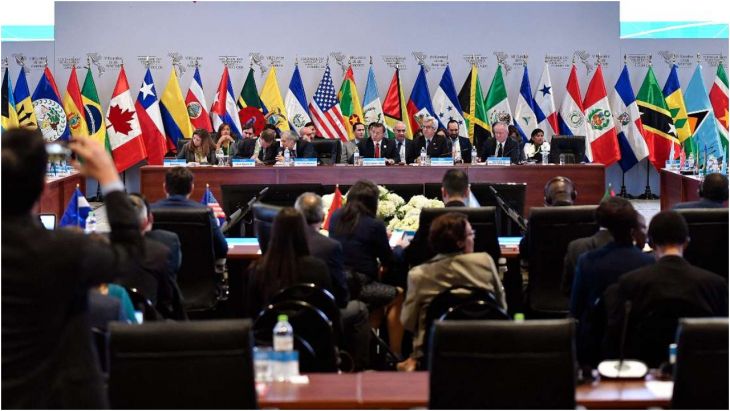The Ninth Summit of the Americas will take place in Los Angeles between June 6th and 10th. The Summit is coordinated by the Organization of American States (OAS) which consists of 33 out of the 35 countries of the Americas. Cuba was suspended in 1962, and Nicaragua quit the organization last month.
The Summits of the Americas are institutionalized gatherings of the heads of state and government of the Western Hemisphere where leaders discuss common policy issues and affirm shared values.
Shared values – its major weakness.
When the first Summit was held in Miami in 1994, the world was still celebrating the fall of the Soviet Empire and was focused on the spread of liberal democracy. The hemisphere was governed by liberal democratic governments (except for Cuba) and there was a strong sense that all countries shared common political values and a shared vision of the future.
Today the hemisphere faces a different reality, and this leads me to ask if the Summit’s process and the OAS are fit for the purpose.
Venezuela’s Hugo Chavez began the shift towards authoritarianism when he won the presidency in 1999. Although Venezuela signed the Democratic Charter of the Americas on September 11, 2001, the Venezuelan delegation to the OAS fought tooth and nail against many of the provisions of the Charter during the negotiations.
Chavez quickly proceeded to strip Venezuela of its democratic institutions and establish authoritarian rule. His mentor was Fidel Castro, and his vision was of a revolutionary “Bolivarian” Latin America united in opposition to liberal democratic values and seeking to establish authoritarian governments based on the Cuban model. Nicaragua and Bolivia followed on the left, and Brazil’s Jair Bolsonaro has tried to create an authoritarian government in Brazil on the right.
The result is that a number of states signatory to the Democratic Charter have stopped respecting it. They have established governments that arrest and imprison political opponents, eliminate freedom of expression and free media, and rendered the judiciary as a weak arm of the presidency.
Hence President Biden is likely to not invite Nicaragua, Venezuela and Cuba to the Summit, although other authoritarian governments such as El Salvador will likely receive an invitation. Brazil’s Bolsonaro has already said that he will not attend, and a number of hemispheric governments that continue to be liberal democracies have said that they will not attend if all thirty-five countries are not invited.
Whether or not President Biden changes his mind and invites representatives of one or more of the dictatorships, the OAS is deeply divided into two camps: the liberal democracies and the authoritarian states. A major problem is that, traditionally, the OAS has been seen as a political arm of an interventionist United States by many Latin Americans. Hence the ambivalence of many in the hemisphere towards the organization.
Can it survive as a viable political institution, or will it continue to be a forum at which countries speak past each other in support of competing and completely incompatible ideologies?
A smaller and streamlined OAS can serve as a forum to discuss global issues that transcend national borders, such as crime, climate change, health (through the Pan American health Organization), narcotrafficking, trade, immigration, the regulation and management of social media, and telecommunications, issues upon which common ground can be found.
But, at this time, I believe that its usefulness as a political body that aims to promote democratic rule and respect for human rights is nil. The rise in authoritarian and populist leaders in other hemispheric countries and the support of Caribbean democracies for these regimes cannot lead to real dialogue and change. The OAS should stop flogging a dead horse and concentrate on the lowest common denominators – those issues that can find consensus and leave aside the issues that polarize its membership with no remedy in sight.
Perhaps it is time to suspend the Summits process and pursue a hemispheric body smaller in size that brings together liberal democracies to strengthen their institutions, train their young citizens in democratic leadership, and coalesce around a set of values that will allow citizens to meet the challenge of authoritarian populism in their own countries rather than try to preach to those in authoritarian states who cannot listen due to government control and repression.
It may be time to significantly change the structures and orientation of hemispheric bodies so that there is no pretense about what they are about, waste fewer resources in trying to sustain unrealistic goals, and focus on the possible rather than the illusionary.
Keep reading: The Canadian Right
Edición: Laura Espejo
